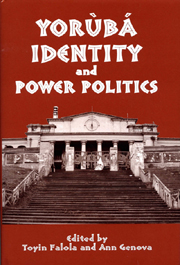Book contents
- Frontmatter
- Contents
- List of Illustrations
- Introduction
- Part I Writing Yorùbá
- Part II Chiefs and Tradition
- Part III Identity and Modern Politics
- 12 Approaching the Study of the Yorùbá Diaspora in Northern Nigeria
- 13 Yorùbá-Nigerians in Toronto: Transnational Practices and Experiences
- 14 Yorùbá Factor in Nigerian Politics
- 15 Politics, Ethnicity, and the Struggle for Autonomy and Democracy
- 16 Petroleum and Ethno-Politics
- 17 Chief M. K. O. Abiọla's Presidential Ambitions and Yorùbá Democratic Rights
- Notes on the Contributors
- Index
14 - Yorùbá Factor in Nigerian Politics
from Part III - Identity and Modern Politics
Published online by Cambridge University Press: 12 September 2012
- Frontmatter
- Contents
- List of Illustrations
- Introduction
- Part I Writing Yorùbá
- Part II Chiefs and Tradition
- Part III Identity and Modern Politics
- 12 Approaching the Study of the Yorùbá Diaspora in Northern Nigeria
- 13 Yorùbá-Nigerians in Toronto: Transnational Practices and Experiences
- 14 Yorùbá Factor in Nigerian Politics
- 15 Politics, Ethnicity, and the Struggle for Autonomy and Democracy
- 16 Petroleum and Ethno-Politics
- 17 Chief M. K. O. Abiọla's Presidential Ambitions and Yorùbá Democratic Rights
- Notes on the Contributors
- Index
Summary
Introduction
As one of the major ethnic groups in Nigeria, the Yorùbá have played prominent roles in the politics of the country since the colonial period. They came into the frontline of Nigerian politics with their previous experience of sophisticated centralized governments, their closeness to, and participation in, colonial administration, and their access to Western education. Their early interaction with the Europeans, especially the missionaries and colonial officials, helped them to adjust to a Western-styled political system.
This chapter concentrates on the contributions of the Yorùbá people to the growth of Nigerian politics from the colonial period to the present. It highlights some nationalist leaders who struggled for the decolonization and independence of Nigeria. They include Herbert Macaulay, Ladipo Solanke, and Ọbafẹmi Awolọwọ. In 1923, Herbert Macaulay formed the Nigerian National Democratic Party (NNDP). In 1951 the Ẹgbé. Ọmọ Odùduwà (society of the children of Odùduwà), a Yorùbá cultural group, led by Ọbafẹmi Awolọwọ, was transformed into a political party called the Action Group (AG). The Yorùbá suffered from the political instability that resulted from a series of military coups. The events that occurred in the Western Region in 1965 became the beginning of the political turning point for Nigeria. Leaders such as Samuel Akintola were assassinated. In the 1980s and 1990s, a turbulent period for Nigeria, Yorùbá politicians, and leaders strongly stood for the principles inherent in a democracy.
- Type
- Chapter
- Information
- Yorùbá Identity and Power Politics , pp. 273 - 296Publisher: Boydell & BrewerPrint publication year: 2006

